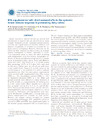Identificador persistente para citar o vincular este elemento:
https://accedacris.ulpgc.es/jspui/handle/10553/105890
| Título: | Milk supplemented with dried seaweed affects the systemic innate immune response in preweaning dairy calves | Autores/as: | Samarasinghe, M. B. Sehested, J. Weisbjerg, M. R. Vestergaard, M. Hernández Castellano, Lorenzo Enrique |
Clasificación UNESCO: | 310907 Patología 3104 Producción Animal 310903 Inmunología |
Palabras clave: | Immune response Ulva lactuca Ascophyllum nodosum Saccharina latissima |
Fecha de publicación: | 2021 | Publicación seriada: | Journal of Dairy Science | Resumen: | Intact seaweed or seaweed extracts are used as feed supplements to improve the gut microbiome in young animals. Seaweeds provide functional polysaccharides, and they are a good source of vitamins, minerals, and phenolic compounds, all of which are relevant for immune system development. However, literature on the effects of dried seaweed supplementation on immune system development is limited, especially in calves. This experiment aimed to study the effect of feeding milk supplemented with Ulva lactuca, Ascophyllum nodosum, or Saccharina latissima on the systemic immune status of preweaning dairy calves. Forty male Holstein calves with birth body weight 41 ± 4 kg and plasma Brix percentage ≥8.7% at d 2 after birth were used in this study. Calves were fed 4 L of cow milk twice a day (total 8 L/d). From d 2 to d 28, calves in the control group (n = 10) received milk without seaweed supplementation. Over the same period, experimental calves received milk supplemented with Ulva lactuca (SW1; n = 10), Ascophyllum nodosum (SW2; n = 10), or Saccharina latissima (SW3, n = 10). Dried and ground seaweeds were offered at a daily allowance of 50 g/8 L of milk (i.e., approximately 5% inclusion rate on a dry matter basis). Blood samples were collected from a jugular vein on d 2, 4, 7, 14, 21, and 28 after birth. Plasma concentrations of total protein, albumin, immunoglobulins, and acute-phase proteins (i.e., serum amyloid A, fibrinogen, and haptoglobin) were measured. We detected no differences in average daily gain, plasma immunoglobulins, albumin, or total protein. However, the contrast analysis revealed that plasma concentrations of fibrinogen (SW1 and SW2) and serum amyloid A (SW2 and SW3) were significantly higher in the seaweed groups compared with the control group. We also found a tendency for high plasma haptoglobin in the seaweed groups (SW1 and SW2) compared with the control group. Differences in acute-phase protein concentrations could be partially explained by the large differences in micromineral intake between control and seaweed-supplemented calves. Feeding milk supplemented with dried seaweed increased plasma concentrations of variables related to the innate immune response in preweaning dairy calves. | URI: | https://accedacris.ulpgc.es/handle/10553/105890 | ISSN: | 0022-0302 | DOI: | 10.3168/jds.2020-19528 | Fuente: | Journal of Dairy Science [ISSN 0022-0302], v. 104 (3), p. 3575-3584 |
| Colección: | Artículos |
Citas de WEB OF SCIENCETM
Citations
15
actualizado el 01-feb-2026
Visitas 5
314
actualizado el 15-ene-2026
Descargas
243
actualizado el 15-ene-2026
Google ScholarTM
Verifica
Altmetric
Comparte
Exporta metadatos
Los elementos en ULPGC accedaCRIS están protegidos por derechos de autor con todos los derechos reservados, a menos que se indique lo contrario.
